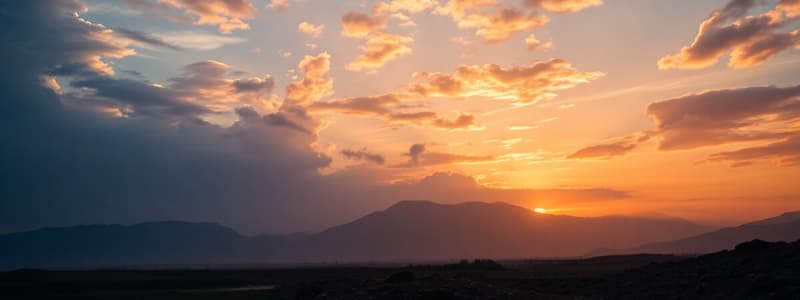Podcast
Questions and Answers
How does global warming affect the levels of evaporation from water bodies?
How does global warming affect the levels of evaporation from water bodies?
- It increases evaporation from oceans, lakes, and rivers. (correct)
- It causes a steady state in evaporation rates.
- It decreases evaporation rates significantly.
- It has no discernible effect on evaporation rates.
What is one of the consequences of melting glaciers and polar ice caps?
What is one of the consequences of melting glaciers and polar ice caps?
- Decreased sea levels.
- Stabilization of coastal ecosystems.
- Increased flooding in low-lying coastal areas. (correct)
- Formation of additional ice caps.
How does global warming impact precipitation patterns?
How does global warming impact precipitation patterns?
- It results in less variability in weather patterns.
- It leads to uniform rainfall across all regions.
- It eliminates heavy rainfall occurrences entirely.
- It can cause extreme rainfall events and prolonged droughts. (correct)
What effect does increased CO₂ in the atmosphere have on the oceans?
What effect does increased CO₂ in the atmosphere have on the oceans?
What impact does melting glaciers have on fresh water availability?
What impact does melting glaciers have on fresh water availability?
Flashcards are hidden until you start studying
Study Notes
Increased Evaporation
- Global warming causes increased evaporation from bodies of water due to rising temperatures.
- This leads to more water vapor in the atmosphere, which can cause more intense rainfall in some areas but droughts in others.
Rising Sea Levels
- Global warming causes glaciers and polar ice caps to melt, contributing to rising sea levels.
- Additionally, warmer water expands, further contributing to the rise in sea levels.
- Rising sea levels can cause flooding in coastal areas and affect ecosystems and human habitats.
Changed Precipitation Patterns
- Global warming disrupts weather patterns, leading to more extreme rainfall events.
- Some areas will experience heavy rainfall and flooding, while others may experience prolonged drought.
- These changes can impact water supplies and agriculture.
Ocean Acidification
- Increased CO₂ in the atmosphere dissolves into seawater, forming carbonic acid.
- This makes the oceans more acidic, which can harm marine ecosystems, particularly coral reefs and shellfish.
Melting Ice Sheets and Glaciers
- Melting ice sheets and glaciers cause rapid changes in river flows, especially those relying on meltwater.
- Changes in river flow can affect agriculture, drinking water supply, and energy production.
Studying That Suits You
Use AI to generate personalized quizzes and flashcards to suit your learning preferences.




